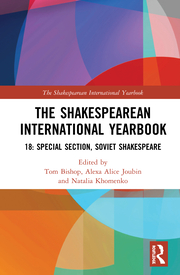Back in the USSR with Shakespeare:
The Special Section on Soviet Shakespeare in The Shakespearean International Yearbook
In the 1930s, the Soviet Union (USSR) lauded Shakespeare as a prophetic playwright who, while writing in early modern England, foresaw the future revolutions and the eventual advent of socialism. Shakespeare studies and performance became an important part of the Soviet claims to cultural and moral authority, throughout the Stalinist period and beyond.
For example, in a 1942 letter recently discovered in the Folger Institutional Archives, Soviet scholars and theater practitioners argue that the Soviet state’s appreciation of Shakespeare identifies it as deserving of American assistance in the Second World War. Having listed the various Shakespeare-related initiatives undertaken by Soviet institutions during the war years, the letter concludes:
Shakespeare proved to be a wonderfully versatile instrument. After the Second World War ended in the defeat of the Nazi Germany, Soviet propaganda seamlessly cycled back to chiding the United States for their capitalism-infected approaches to Shakespeare’s drama while congratulating Soviet institutions on successfully disseminating socialist readings of Shakespeare across its vast territories, including the recently annexed states.
 The special section on Soviet Shakespeare in The Shakespearean International Yearbook (volume 18, 2020, co-edited by Tom Bishop, Alexa Alice Joubin, and Natalia Khomenko) probes the complex engagements with the playwright and his works after the Russian Revolution of 1917. Focusing on how the construct of Soviet Shakespeare was formed and re-formed in the context of the changing ideologies, this cluster foregrounds the cultural conversations conducted in Russian. At the same time, it looks at the role played by Shakespeare in the cultural and political encounters within the Soviet Bloc, including non-Russian states, and in the relationships between the USSR and the West. Finally, this cluster asks what happened to the construct of Soviet Shakespeare after the USSR collapsed in 1991, forcing Russia to rebuild its national identity and to develop a new relationship to its recent past.
The special section on Soviet Shakespeare in The Shakespearean International Yearbook (volume 18, 2020, co-edited by Tom Bishop, Alexa Alice Joubin, and Natalia Khomenko) probes the complex engagements with the playwright and his works after the Russian Revolution of 1917. Focusing on how the construct of Soviet Shakespeare was formed and re-formed in the context of the changing ideologies, this cluster foregrounds the cultural conversations conducted in Russian. At the same time, it looks at the role played by Shakespeare in the cultural and political encounters within the Soviet Bloc, including non-Russian states, and in the relationships between the USSR and the West. Finally, this cluster asks what happened to the construct of Soviet Shakespeare after the USSR collapsed in 1991, forcing Russia to rebuild its national identity and to develop a new relationship to its recent past.
Soviet negotiations of Shakespeare’s significance have been underexplored in the West. Western scholars have tended to assume 1) that the socialist realist vision of the playwright had remained relatively consistent and stable throughout the Soviet period, and 2) that all worthwhile theatrical, literary, or scholarly responses to Shakespeare’s plays during this time were ideologically and political subversive. Grigori Kozintsev’s two Shakespearean films, Hamlet (1964) and King Lear (1971), have been disproportionately represented in Anglophone studies, and usually read as expressions of political dissent in spite of Kozintsev’s privileged position in the USSR and the many publications in which he described his ideas and goals.
This special section in The Shakespearean International Yearbook has made a point of not revisiting Kozintsev’s films or other overly familiar examples of Soviet Shakespeare, such as Sergei Prokofiev’s much-discussed ballet Romeo and Juliet (1935) or Jan Kott’s monograph Shakespeare, Our Contemporary (1964). Instead, the contributors to this cluster prioritized the lesser-known instances of adaptation, appropriation, exchange, and resistance during and following the Soviet period. The essays emphasize that Soviet Shakespeare was and continues to be, retroactively, a work-in-progress, dependent on the immediate demands stemming from political and social tensions. As a whole, this special section seeks to analyze what informed each iteration of this construct as well as what kinds of creative and scholarly exploration it might have enabled and promoted.
The essays within the special section are organized in four roughly chronological groupings:
- Early Soviet Context
The essays in this subsection ask what considerations – ideological, artistic, and scholarly –shaped the treatments of Shakespeare in the first decades after the revolution.
Aleksei Semenenko discusses the early Soviet efforts to produce translations that would clearly demonstrate the purported realism of Shakespeare’s writing. This essay examines the career of scholar and translator Ivan Aksenov, highlighting the ways in which Aksenov’s lifelong interest in Elizabethan literature and in Shakespeare specifically was forced to adapt to the ideological emphasis on historical dialectics in the 1930s.
Taking up early Soviet performance, Kim Axline Morgan analyzes two productions of Hamlet: Michael Chekhov’s (1924) and Nikolay Akimov’s (1932), with close attention to the critical and scholarly responses in each case. This essay suggests that both Chekhov and Akimov, whose work on Hamlet is usually read as subversive, were in fact aiming to produce a revolutionary vision of the play but in each case fell short of the rapidly evolving ideological views of Shakespeare.
Irena Makaryk asks a seemingly simple question: Did Stalin read and like Shakespeare? The essay evaluates biographical accounts of Stalin’s early life and the extant evidence of his references to Shakespeare, concluding that Stalin’s supposed interest in Shakespeare’s plays was part of a broader argument for the Soviet cultural authority, both within the USSR and in the West.
- Late Soviet Context
The essays in this subsection move into the post-Stalinist era, examining how Shakespeare’s plays were adapted and what social and political aims these adaptations might have served.
Natalia Khomenko traces Soviet adaptations of Romeo and Juliet across a range of genres, from the initial post-revolutionary period into the 1970s. This essay suggests that, initially interpreted as modelling ideologically useful feeling, the play was later deployed in supporting the revolution of individual feeling against the ideological constraints.
Bringing our attention back to Hamlet, Michelle Assay considers two Soviet operas based on the play: one composed by the Georgian Alexi Machavariani in 1967 and another composed by the Russian Sergei Slonimsky in 1991. This essay interrogates the assumption that artists naturally aim to subvert totalitarian regimes, teasing out the nuanced interplay of political, nationalistic, and personal factors in these two operatic adaptations.
- Soviet but Not Russian
Picking up the earlier discussion of the Georgian composer Machavariani, this subsection zooms out to address the role of Shakespearean adaptation in the encounters and exchanges between Russia and other states within the Soviet Bloc.
Madalina Nicolaescu shows how Shakespeare studies could be used, by Romanian scholars, to import Western ideas and literary approaches in covert defiance Soviet cultural ideologies. Focusing on the Shakespeare scholar Tudor Vianu, this essay explores his scholarship’s careful negotiations with socialist realism and his promotion of independent research and critical thinking.
In analyzing a Slovak National Theatre’s take on The Comedy of Errors in Czechoslovakia (1971), Jana B. Wild questions the extent to which we can trust theatre reviews produced in an occupied country on the brink of a totalitarian regime. This essay brings together the extant production documents and images and the scholar’s own childhood memories of the period to re-read the production as a multi-layered critique of the Soviet invasion.
- The Soviet Past After the Collapse
The essays in this subsection address the construct of Soviet Shakespeare as re-imagined from the vantage point of post-collapse Russia, in literature and scholarship.
Sabina Amanbayeva uses Elena Chizhova’s more recent novel Kroshki Zaches (Little Zaches, 2000) as a lens to re-examine the Soviet construction of Shakespeare for the people. This essay highlights the post-collapse rejection of Soviet Shakespeare appropriations, perceived as a crude tool of political repression, and outlines Russia’s newly ignited desire for elite art.
In an innovative take on Shakespeare and cultural appropriation, Vladimir Makarov looks at the anti-Stratfordian turn in post-collapse Russia. This essay proposes that the project of uncovering the “real” author is, in this case, closely connected to rejecting the Soviet interpretations of Shakespeare and to re-embracing the belief in the Russian culture’s messianic role.
Conclusion
This small collection of essays serves as an introduction to the polyvocality inherent in the engagements with Shakespeare across the Soviet and post-Soviet space. Within the expanding field of Global Shakespeare, Soviet appropriations are an important addition to the Western traditions of performance, literary adaptation, and scholarship.
 To view a 2017 Russian adaptation, visit the page curated by Natalia Khomenko on Pavel Safonov’s Twelfth Night in Moscow.
To view a 2017 Russian adaptation, visit the page curated by Natalia Khomenko on Pavel Safonov’s Twelfth Night in Moscow.
Natalia Khomenko is an Instructor at York University in Toronto, Canada, where she received her Ph.D. in English in 2013. Her research interests include early modern drama, hagiographic and martyrological literature, literary adaptation, and Global Shakespeare studies. Her current project explores the cult of Shakespeare in the Soviet Union, and the strategies of selective reading and active refashioning used to produce ideologically sound socialist versions of Shakespearean drama.





hello, i translated Elena Chizhova’s Kroshki Zaches into English some years ago and would be interested n reading Sabina Amanbayeva’s essay, in Russian or English.
Thank you,
Carol Ermakova